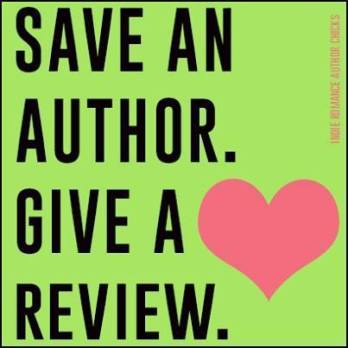How to Tell an Indie Author that You Love Them

Write a review. Please. And, thank you.
There’s a lot to be said about this, but that’s the cold, hard gist of it. Each year, hundreds of thousands of new writers join the millions who are already engaged in self-publishing. Thanks to platforms like Amazon and CreateSpace, millions of new books are flooding the worldwide market.
I recently joined the ranks of new authors (The Death of Constance is a BDSM erotic thriller, available now, if you’re into that sort of thing) along with my coauthor Amburgese Rain; it’s been an adventure, a rewarding experience, and a lot of fun. A simple release party on an indie authors group on Facebook can lead to a few hundred dollars in sales, right away, but for anything bigger—to climb the ranks; to become known? That takes some serious elbow grease, thanks to the level of competition.
This is not a bad thing. It’s “the more, the merrier.” And, thanks to eBooks, reading habits are actually on the rise: print sales are gradually declining, but the difference is vastly outpaced by the number of people using e-readers. Until conclusive evidence is presented as to e-readers somehow being “harmful,” there is no reason to discount electronic readership as being somehow “different.”
I love a hard copy as much as the next B&N haunt, but—ultimately—books are books. I’m sure people complained when we stopped using clay tablets, and again when we stopped using parchment scrolls.
Another Non-Sequitur “Nick Can’t Stay on Topic” Moment: Digital Information Death
To those worried about the eventual decay of electronic media, a phenomenon sometimes called “digital information death” or “digital information disintegration,” modern books disintegrate after a few decades. Books from five decades ago are frequently in worse shape than books from five centuries ago. The medium of the written novel began using cheaper, less durable materials a while back, and nobody noticed—except to appreciate the associated decrease in pricing, which e-readers have once more delivered.
Back to Indie Books and Writing Reviews

The sheer number of new books and fledgling authors has led to the saturation of many commonly read genres, both in fiction and in nonfiction. As a rule, “commonly read” equates to “commonly written;” it’s mostly readers who become writers, and the self-publishing community relies heavily on community support. People also tend to write within genres and subject matter which they personally enjoy reading about.
As a result, there are simply too many books for online publishing and marketing platforms to keep track of via traditional methods. This has resulted in their finding ways to essentially narrow down the list, without actually discriminating directly against authors based on subject matter or preferred genre. To be fair, the latter is the avenue being taken by many traditional agents and publishing houses (it is common, for example, to stumble upon “no longer accept manuscripts within the fantasy genre” in the course of one’s search for a potential outlet).
What the online platforms have done, in response to the glut of new literature, is to focus related product searches and other incidental promotional efforts on customer reviews. Books on Amazon are ranked, referenced, and promoted based upon customer rankings and reviews, with books that have no reviews loitering in a negative space that is in some ways even more disadvantageous than having an overall negative reception.
How to Write a Review

There are lots of places which offer tips and advice on how to write the perfect review. What they tend to neglect (though not always; thanks for the ample assistance, Kyle!) is the fact that even something quick, low-effort, but high-energy is far more valuable than nothing—even more than a standalone rating. The simple act of taking a few moments out of your day to submit a review at all is what Amazon and other markets are looking for. The rest is icing. Sweet, sexy, succulent icing—but still icing.
Reviews in places like Amazon and Goodreads don’t have to be lengthy. They can be as simple as “Great job; can’t wait for the next one!” or even “I liked it!” along with an honest rating. Goodreads also offers other forms of engagement, including a forum for questions, quizzes, and trivia questions relating to the book.
Frankly, many authors don’t pay enough attention to these features.
Would You Like to Know More?
- Amazon’s Customer Review Guidelines. They’re pretty much common sense, but everybody involved in the industry ought to read them at least once as a reminder.
- The best reviews on Goodreads; a weekly/monthly/annual/all-time list of the site’s 50 most popular book reviews in the United States. If you really want to do your favorite authors a favor in return, this is where to go to find some good examples. It’s applicable outside of Goodreads as well.
- From Bustle.com, Nine Websites for Readers Who Think About Books All Day, Every day. As with Goodreads (which is on the list) it’s to the indie author’s benefit to be familiar with these websites as well!
- Join The Hive on Facebook, a group dedicated to indie authors pooling their resources to provide a mutually supportive boost to new authors. Mind you that “mutual” is a point of emphasis—but it’s the effort that counts!

Reblogged this on carsonrenomysteryseries.com.
LikeLiked by 1 person
Thank you very much for sharing! Following your blog now 🙂
LikeLike
Reblogged this on The Owl Lady.
LikeLiked by 1 person
Thanks for the share; I appreciate it. Following now, you’ve got a great blog!
LikeLike
Reblogged this on Author Kyle Perkins.
LikeLiked by 1 person
Thanks for sharing, man! I’d follow you, if I weren’t already following you. Maybe I’ll unfollow you so I can follow you again.
LikeLiked by 1 person